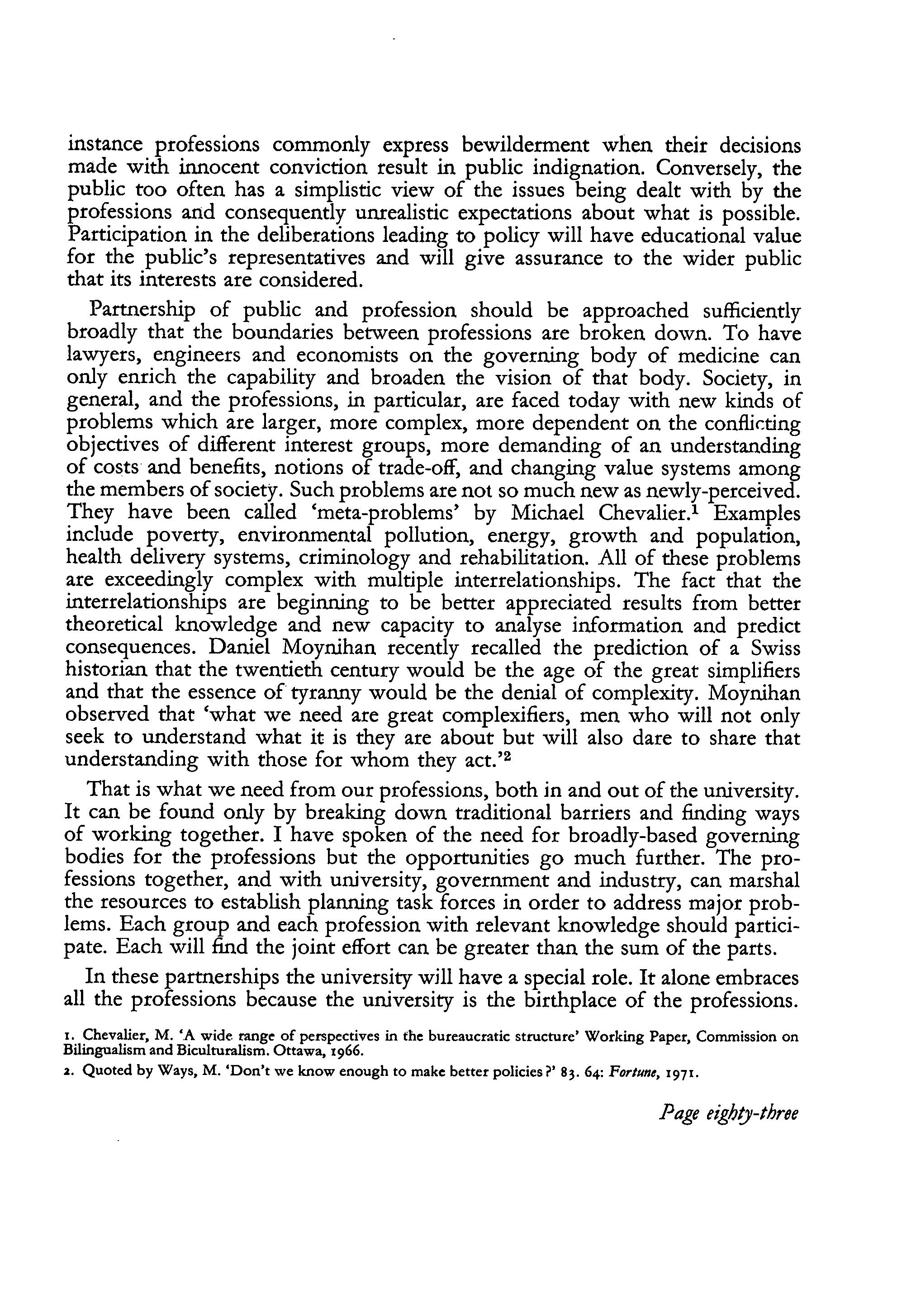
7 minute read
Previous Foundation Publications
instance professions commonly express bewilderment when their decisions made with innocent conviction result in public indignation. Conversely, the public too often has a simplistic view of the issues being dealt with by the professions and consequently unrealistic expectations about what is possible. Participation in the deliberations leading to policy will have educational value for the public's representatives and will give assurance to the wider public that its interests are considered.
Partnership of public and profession should be approached sufficiently broadly that the boundaries between professions are broken down. To have lawyers, engineers and economists on the governing body of medicine can only enrich the capability and broaden the vision of that body. Society, in general, and the professions, in particular, are faced today with new kinds of problems which are larger, more complex, more dependent on the conflicting objectives of different interest groups, more demanding of an understanding of costs and benefits, notions of trade-off, and changing value systems among the members of society. Such problems are not so much new as newly-perceived. They have been called 'meta-problems' by Michael Chevalier.' Examples include poverty, environmental pollution, energy, growth and population, health delivery systems, criminology and rehabilitation. All of these problems are exceedingly complex with multiple interrelationships. The fact that the interrelationships are beginning to be better appreciated results from better theoretical knowledge and new capacity to analyse information and predict consequences. Daniel Moynihan recently recalled the prediction of a Swiss historian that the twentieth century would be the age of the great simplifiers and that the essence of tyranny would be the denial of complexity. Moynihan observed that 'what we need are great complexifiers, men who will not only seek to understand what it is they are about but will also dare to share that understanding with those for whom they act.12
Advertisement
That is what we need from our professions, both in and out of the university. It can be found only by breaking down traditional barriers and finding ways of working together. I have spoken of the need for broadly-based governing bodies for the professions but the opportunities go much further. The professions together, and with university, government and industry, can marshal the resources to establish planning task forces in order to address major problems. Each group and each profession with relevant knowledge should participate. Each will find the joint effort can be greater than the sum of the parts.
In these partnerships the university will have a special role. It alone embraces all the professions because the university is the birthplace of the professions.
. Chevali er,M. 'A wide range of perspectives in the bureaucratic structure' Working Paper, Commission on
Bilingualism and Biculturalism. Ottawa, 5966.
2. Quoted by Ways, M. 'Don't we know enough to make better policies?' 83. 64: Fortune, 1971.
Page eigbty-three
The university has, however, a unique role in the thoughtful study of the theory underpinning each profession. John Gardiner has said that 'every great modern university must balance its responsibilities to the worlds of reflection and action." We need in our universities opportunities for quiet and isolated scholarship. We need to preserve an environment where the disengaged scholar, artist, scientist, can live and flourish. We need to make our universities places where our students can have personal contact with great minds and where they are given not only vocational opportunity, but the chance to grow as human beings. At the same time, we must recognize at the other end of the spectrum that a university must bear an intimate relationship with the rest of society. The ivory tower is no longer enough. Perhaps it never was. Today the university needs the professions, business and government, and they in turn need the university. The universities, while gaining strength through participation, must know that they have a duty to remain distinctive. They must, whatever the associations and whatever the pressures, remain devoted to a 'spirit of inquiry and creativity, to a search for truth. If the universities continue to respect and honour this central mission they can contribute to human welfare in greater measure. If they can simultaneously work more and, more closely with the professions which they spawn the partnership can release new sources of power for human betterment.2
x. G2rdiner J. W. 'The world of reflection and action'. Sdente 15 4 November i8th, 1966. 2. Macdonald, John B. 'Interaction of Universities, Professions' and Industry,' Annals N.Y. Acad. S. 153:
7-I1 1968.

Page eighty-four
PUBLICATIONS OCCASIONAL PAPERS
*No. I 'Social Work Training Needs in East Africa.' Report on Regional Seminar in Uganda, December 1967. *No. II 'Medical Education in Papua/New Guinea (with special reference to the Teaching and Practice of Obstetrics).' Professor November 1968. J. Lawson, F.R.C.O.G., *No. III 'Professional Managers in Indian Industry.' G. J. West, F.ç.c.s., F.R.S.A., General Secretary, British Institute of Works Managers, December 1968. *No IV 'Mental Health Problems in the Developing World.' Report on Mental Health Workshops in Edinburgh (1968) and Kampala (1969). *No V 'Quality in Education.' Report on a Conference of Inspectors of Schools from the Asia/Pacific area of the Commonwealth, Singapore, 1969. *No. VII 'Speech and Hearing Problems in South East Asia.' 1969. *No. VII 'East Coast Fever.' Final report of Edinburgh African Veterinary Expedi- tion, 1969. No. VIII 'Conference of Librarians from Commonwealth Universities in Africa.' Report of Proceedings at Lusaka, August 1969. (Since reprinted.) *No. IX 'Work Study Practice.' Report on a Regional Commonwealth Work Study Seminar, Singapore, May 1970. No. X 'Orthopdic Problems in the Developing World.' Report on a Common- wealth Lecture tour by Professor R. L. Huckstep. Makerere University Medical School, July—September 1970. (Since reprinted.) *No. XI 'Manpower Planning in the South Pacific.' Regional Seminar in Fiji, July 1970. *No. XII 'Communications and University Teaching with particular reference to the Caribbean.' A Report from the Inter-University Research Unit, Cambridge. No. Xliii 'The Role of the Professions in a Changing World.' Report on a Conference held at the Professional Centre of Singapore, October 1971. No. XIV 'Human Ecology in the Commonwealth;' Report of a Symposium held in London in November 1971 by the Commonwealth Human Ecology Council. No. XV 'Adult Education and National Development.' Report of a Commonwealth Planning Seminar held at the University of Manchester in October 1972. (Reprinted 1973.) No. XVI 'The Commonwealth Foundation Race Relations Bursary Scheme.' Report on a Seminar, September 1972.

Page eightjv-five
No. XVII 'The Application of Architectural Research to Practice.' Report on a Commonwealth Seminar at Edinburgh, January 1973. No. XVIII 'The Organization of Science and Technology for Development.' Report on a 1973 Foundation Caribbean Lecture Tour by Dr K. F. Tupper, formerly Vice-President, Canadian National Research Council. No. XIX 'Commonwealth University Co-operation.' Report on a Foundationsponsored seminar at the I.D.S. Sussex. August-September 1973. No. XX Report on a Team Visit to Universities in Commonwealth West Africa from the Universities of the West Indies and of Guyana, 1973. No. XXI 'Social Significance in Science and Mathematics Teaching.' Report on a Commonwealth Conference held at the University of the West Indies, Jamaica. March 29th-April 2nd, 1973. No. XXII 'Quality Education for National Development - The Role of the Adviser.' Report of a Regional Symposium held in Fiji, August-September 1973. No. XXIII 'Orthopedic Training in Developing Countries.' An International Symposium sponsored by the Commonwealth Foundation and the National Fund for Research into Crippling Diseases. Oriel College, Oxford. September 12th-15th, 1973. No. XXIV 'Rural-Urban Migration in Tropical Africa.' Report on a Commonwealth Foundation Lecture Tour by Guy Hunter, C.M.G. No. XXV 'Meeting the Health Needs of our Developing Countries - Past, Present and Future.' Report on a Commonwealth Foundation Lecture Tour by Professor S. R. A. Dodu, M.D., F.R.C.P., Dean, University of Ghana Medical School. October 1973-May 1974. No. XXVI 'Adult Education and National Development.' Report of a Commonwealth Regional Seminar held in New Delhi, March 1974. No. XXVII Surveying and Land Economy in the Commonwealth. No. XXVIII Commonwealth Co-operation. The Role of the Professional Associations. No. XXIX Rural-Urban Drift in Africa. No. XXX Problems Confronting the Industrial Scientist. No. XXXI 'Human Ecology and Hong Kong.' Report of a Conference held in Hong Kong in April 1972 by the Commonwealth Human Ecology Council. *Now out of print.

First Major Publication 'Professional Organizations in the Commonwealth' (detailing upwards of 1,000 professional and learned societies and Commonwealth-wide associations). Published by Hutchinson of London, June 1970. 511 preparation.) pp. Price £4•50 (Second edition now in
Page eigh1y-six
Printed in England by Staples Printers Limited at The Priory Press, St Albans, Hertfordshire







